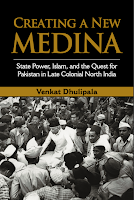Can Pakistan be a modern nation-state? The answer, according to historian Venkat Dhulipala, is no. In his book Creating a New Medina, he posits that in the 1930s and 1940s, Pakistan was conceived as Islam’s “New Medina,” not as a modern secular nation.
The Ottoman caliphate had been abolished in 1924, on the initiative of Turkey’s leader Mustafa Kemal Pasha, and the Islamic theocrats and politicians in the Indian subcontinent were energized by the ambition of making Pakistan the new Islamic caliphate (the New Medina). The Muslim League, the Deobandi ulama, the intellectuals and students of the Aligarh Muslim University, the founding members of the Jamia Millia Islamia University, and other Islamic groups became enthusiastic participants in the project for creating a “New Medina.”
Dhulipala challenges the contention that the ulema did not want partition. He cites the writings and speeches of the ulema, who were spearheading the movement for carving out a separate homeland for muslims, to prove that they viewed Pakistan as “the first Islamic state in history that would attempt to reconstruct the Islamic utopia created by the Prophet in Medina.” (page 5) The ulema used Pakistan and Medina interchangeably in their writings and speeches to solidify the connection in the muslim mind.
In his speech at an ulema conference in Lahore, on 25-27 January 1946, Maulana Shabbir Ahmad Usmani, the founder of the Jamia Millia Islamia University, declared: “just as Medina had provided a base for the eventual victory of Islam in Arabia, Pakistan would pave the way for the triumphal return of Islam as the ruling power over the entire subcontinent. The whole of Hindustan would thus be turned into Pakistan just as the Prophet himself had turned all of Arabia into Pakistan.” (page 361)
Usmani invoked Koranic verses to make a case for Pakistan. He thundered that those who wanted the momin (believers) to live with the kafirs (infidels) were anti-Islam. He insisted that the Indian muslims constituted a separate nation, that the two nation theory was in accord with Islamic traditions, and that the creation of Pakistan was an end as well as a means to a far greater end, namely the Islamization of all of South Asia and the world.
Maulana Ashraf Ali Thanawi, leader of the Deobandi ulema, was happy to see that the muslims were “getting organized in Allah’s name and not in the name of nationalism (watan parasti). He hoped that the Muslim League would eventually become Allah’s lashkar (army).” (page 103) Another Deobandi ulema Maulana Muhammad Manzoor Numani, proclaimed that he saw in a dream Jinnah being treated with love and kindness by Islam’s founder.
Jinnah tried his best to project himself as a secular leader but he could not hide the fact that he was being supported by the ulema who fantasized about creating a New Medina, from where Islam would rise to dominate the world. Without the intellectual and religious backing of the ulema, Jinnah’s movement would have crashed.
Dhulipala takes a look at the role played by the communists in Pakistan’s creation. The communists were enthusiastic supporters of the Muslim League—the interests of the atheist Marxists and Islamic theocrats were closely aligned. But Dhulipala’s thrust in his book is on defining the geopolitical and theocratic ambitions which led the ulema to conceive Pakistan as the New Medina. After reading the historical evidence (speeches, writings, and incidents) that he has compiled, it is hard to disagree with the conclusion that he offers in the book’s final lines:
“the origins of the ‘ideological’ state in Pakistan lie not just in its post-independent insecurities, but at the very core of its nationalist ideology that developed in the run up to 1947. Studies of Pakistan that emphasize its ‘insufficient imagination’ therefore overstate the case. Pakistan was not insufficiently imagined, but plentifully and with ambition. It is this fact, coupled with the failures (and successes) of the state in fulfilling the expectation of a new Medina, which accounts for the crises that confront Pakistan today.” (page 501)

No comments:
Post a Comment